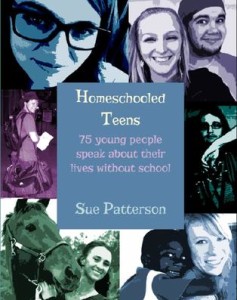 Sue Patterson is a long-time unschooling mom of three grown children. She recently released a book, Homeschooled Teens, where she shares her own insights from unschooling three teens plus what she discovered when she sent out a survey about being homeschooled through adolescence and 75 teens and young adults replied in detail.
Sue Patterson is a long-time unschooling mom of three grown children. She recently released a book, Homeschooled Teens, where she shares her own insights from unschooling three teens plus what she discovered when she sent out a survey about being homeschooled through adolescence and 75 teens and young adults replied in detail.
In this episode, Sue shares some of what she found with us.
Quote of the Week
“Teens are subjected to far more restrictions than are any of the other groups—to roughly twice as many restrictions as incarcerated felons and active-duty Marines and to more than ten times as many as everyday adults.” ~ Robert Epstein, Teen 2.0: Saving Our Children and Families from the Torment of Adolescence.
Episode Highlights
First, Sue shares about her family’s unschooling experience:
- How her family came to unschooling.
- The fascinating threads of interests and activities that wove together to bring her children to where they are today.
- What inspired her to take on this book project.
And then we dig into the book itself:
- Some of the advantages that the respondents saw from not going to school.
- The ways they learned outside the classroom.
- What their social lives looked like.
- Their experiences pursuing interests, hobbies, and jobs.
- The strength of their family relationships.
- Some of the advice the teen and young adult respondents wanted to share with worried parents.
- What surprised her most when she was going through the responses.
Episode Transcript
Links to things mentioned in the show
Unschooling Mom2Mom, a curated information about unschooling, sharing the best of the best: unschoolingmom2mom.com
And the related FB group: Unschooling Mom2Mom
Sue’s book, Homeschooled Teens on Amazon
You can get a free chapter from Sue’s book, Homeschooled Teens, here: suepatterson.com/free-chapter
Sue’s coaching practice, helping families homeschool successfully: suepatterson.com
Related blog posts
Book Review: Homeschooled Teens by Sue Patterson
Five Unconventional Ideas about Relationships with Teens
Teens Reap What Their Parents Sow
What Does Lifelong Learning Look Like?


4-H still offers the international exchange program. For more information see states4hexchange.org.
Thanks for passing that along, Michelle! 🙂
I’m so glad to hear that, Michelle!!!! It disappeared a year or two after Michael went – at least in our area. It was so fun – I hope others will do it too!
Thank you Pam and Sue. This podcast is so interesting and very reassuring. It’s so good to be reminded that we don’t need to panic if our unschooled teen do not find their passion until later, and that curiosity is the most important factor. It does get a little scary sometimes, when you look into college or intern entrance requirements, especially as the government here the UK has made it a lot harder for HE children to access any Further Education (college) without having above D grades in high school exams in Maths and English. Our 14 yr old daughter really doesn’t want to do these exams and I don’t blame her as they are so boring and narrow compared to the wonderful experience she has had so far unschooling. But she may find she will have to take them in the a few years if she decides to attend college…unless of course we get a new government in a couple of years (fingers crossed) who makes a whole new set of rules. The stories of your and Sue’s teenagers are inspiring. Thank you again for this podcast.
Thanks, Luminara, glad you enjoyed the episode.
Yes, at some point any of us may find that our desire to accomplish something outweighs the annoyance of the hoops we need to jump through to get there. Though it’s surprising how often enterprising unschooling children and teens finds new ways to get places that bypass the hoops altogether. 🙂
Like Sue, I, too, felt my children wanting to unschool there own would reflect how they felt about it for themselves, and I, too, have come to discover something different, yet, aligning with unschooling well. I’ve only asked a few of my adult children. My only daughter is an unequivocal yes. Yet, she will be the one primarily responsible, so it makes sense. She has the support of her husband, though (in fact, it was a discussion point before marriage; she wanted to be sure he was supportive beforehand). My second son is a maybe, and his response is, “If my wife wants to do it, I would be happy about it. But it would be up to her.” It’s because he has no interest in being the primary caregiver. He loves to work. My oldest son said probably not, because he is well aware of his emotional well-being (living with bipolar), and that it wouldn’t be conducive to a good learning environment. In fact, he’s chosen not to have children because of this (and probably not marriage, either). So, these are well-thought out answers, as Sue has mentioned. So, yes, it goes quite well with unschooling as people who think carefully about what they know right now about their life circumstances. I think the probably and the maybe leaves it open to future shifts. As mentioned, they can only decide on now. I think my second would encourage it (if he gets married), but respects the primary caregiver’s wishes.
I loved the whole podcast and subject! Thanks for giving me the opportunity to think and ponder!
Thanks, Cindy! Glad you’re enjoying the podcast.
I loved Sue’s point about how unschooled adults are likely to approach the question of unschooling their own children quite sensibly. And thanks for sharing some of the responses from your children. 🙂